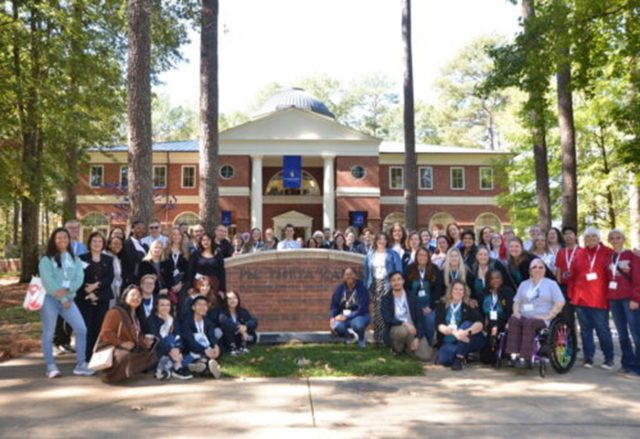When considering the next steps after high school or a career change, it’s easy to feel overwhelmed by the myriad of available options. According to Lynn Tincher-Ladner, an advocate for accessible higher education and the CEO of Phi Theta Kappa Honor Society, community colleges offer a unique and valuable path for students of all ages and backgrounds. Here, Lynn Tincher-Ladner explains eight compelling reasons why community college might be the perfect fit for you.
- Community Colleges Cater to Lifelong Learners
One of the most significant advantages of community colleges, Lynn Tincher-Ladner explains, is their ability to cater to a diverse range of students. Unlike traditional four-year institutions that often focus on recent high school graduates, community colleges welcome learners from all walks of life. Whether you’re fresh out of high school, returning to education after a break, or seeking to change careers, community colleges provide an inclusive environment where students can learn from each other’s varied experiences. This diversity in the classroom enriches the educational experience, fostering a learning environment where multiple perspectives converge and benefit together.
- Community Colleges Offer Time to Grow and Mature
For many students, the transition from high school to college can be daunting. Lynn Tincher-Ladner explains that community colleges offer a supportive environment where students can gradually acclimate to the demands of higher education. These institutions allow students to mature both socially and academically, often at a pace that suits their individual needs. By taking the time to develop essential soft skills and engage in campus life, students at community colleges build a strong foundation that prepares them for future academic success and personal growth.
- An Accessible and Stress-Free Admission Process
The college application process can be a source of anxiety for many students, especially when faced with the stringent requirements of four-year institutions. According to Lynn Tincher-Ladner, community colleges offer a more accessible alternative. With open enrollment policies, many community colleges do not require standardized test scores like the SAT or ACT, nor do they impose strict GPA thresholds. This less stressful admission process enables a broader range of students to pursue higher education without the pressure of meeting rigid criteria.
- Career-Focused Programs and Credentials
For students looking to enter the workforce quickly, community colleges provide valuable career-focused programs. Phi Theta Kappa’s Lynn Tincher-Ladner emphasizes that these programs are designed to equip students with practical skills that are immediately applicable in the job market. Whether you’re seeking an occupational certificate or an associate degree, community colleges offer hands-on training in a variety of fields, from healthcare to technology, that can lead directly to employment opportunities.
- A Launchpad for Academic Improvement
Community colleges serve as a launchpad for students looking to improve their academic standing before transferring to a four-year institution. Lynn Tincher-Ladner explains that community colleges often offer remedial or developmental courses that help students catch up to college-level standards. These courses, while non-credit bearing, provide essential support for students who need to strengthen their academic skills. Additionally, by completing general education requirements at a community college, students can explore their interests and build a solid academic foundation, making them more competitive when transferring to a university.
- Affordable Education with Significant Savings
Cost is a major factor in the decision-making process for many prospective students. Community colleges offer a more affordable alternative to four-year universities, allowing students to save money on tuition and living expenses. Phi Theta Kappa’s Lynn Tincher-Ladner notes that by starting their education at a community college, students can complete their general education requirements at a fraction of the cost. This approach not only reduces student loan debt but also enables students to allocate resources toward further educational pursuits or other life goals.
- A Personalized Learning Experience
Community colleges are known for their smaller class sizes and more personalized approach to education. Lynn Tincher-Ladner highlights that this individualized attention is particularly beneficial for students who may be undecided about their major or those who thrive in a more supportive learning environment. With smaller student-to-teacher ratios, community colleges offer more opportunities for one-on-one interaction with instructors, as well as extensive support services such as tutoring, career counseling, and academic workshops. This personalized approach ensures that students receive the guidance they need to succeed both academically and professionally.
- Flexible and Convenient Course Options
Flexibility is a hallmark of community college education. Lynn Tincher-Ladner explains that community colleges offer a wide range of course formats, including full-time, part-time, online, and evening classes. This flexibility is ideal for non-traditional students who may have work or family obligations. Additionally, community colleges often recognize life or military experience as credit toward a degree, further accommodating students with diverse backgrounds. With year-round enrollment options and the ability to graduate early by taking summer courses, community colleges provide a convenient pathway to achieving one’s educational and career goals.
In an increasingly competitive world, making the right choice for higher education is crucial. Phi Theta Kappa’s Lynn Tincher-Ladner emphasizes that community colleges offer a versatile and valuable option for students at any stage of life. Whether you’re looking to start a new career, save on tuition costs, or simply explore your academic interests in a supportive environment, community colleges provide the resources and opportunities needed to succeed. By considering these eight compelling reasons, students can determine if community college is the right fit for their educational and professional aspirations.








